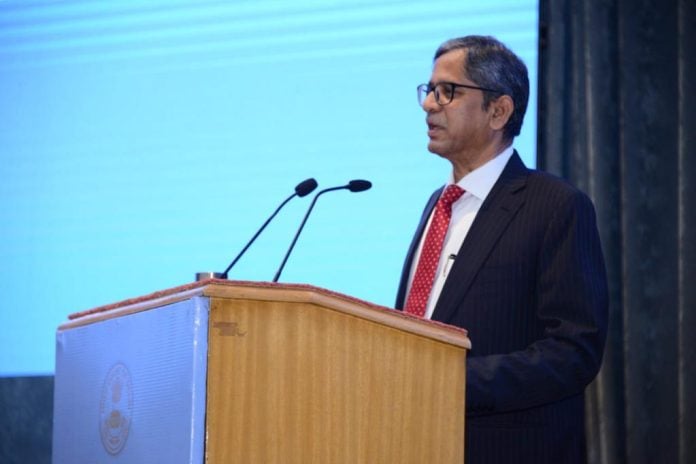Chief Justice of India N.V. Ramana, who is on a visit to San Francisco, on Saturday said the The Indian Diaspora in the United States has played an active role in the
building of modern America.
Addressing the Indian diaspora, he said “From modest beginnings, you have
transformed not only your identities, but also the face of this nation. This journey was made possible only because of your sheer hard work, passion and dedication.
“It is the progressive partnership between the people of India and America that has led to massive bilateral goods trade
worth 113 billion dollars in 2021. I am very happy to learn that 50 per cent of the B2B Start-Ups in the Silicon Valley are
founded/funded or run by the Indians,” he added.
According to CJI Ramana, “This huge leap will certainly inspire and motivate Indians everywhere. As a modest working class, dynamic entrepreneurs, brilliant scientists and intellectuals, compassionate doctors, talented artists, leading statesmen and administrators, the Indian Community has contributed to all walks of life.”
The CJI said the Indian diaspora in the US were the true ambassadors of India and its culture.
“Distance and time have not kept you away from your motherland. You have always actively contributed to the welfare of India. In your own way, you have helped to build two nations simultaneously.
“You have never lost sight of your ancestral land and its culture. As Mahatma Gandhi said, ‘the cotton thread of love’ that binds all of you to
your community is too strong to break.
“You celebrate festivals with great pride and joy. Active efforts are taken
to support the growth of the mother tongue, and many of you are patrons to the arts of India. The largest Indian Independence Day parade, outside
India, takes place in the United States.
You are the true ambassadors of what India stands for. You have introduced to the world, the culture and teachings of India.
“Wherever you are, your Indian values of
care, respect, fraternity and tolerance must shine through. India resides in all of you. As renowned author of Roots, Alex Haley aptly said, ‘In every conceivable manner, the family is link to our past, bridge to our future’.
“From the data available, it may be safe to suggest that it is the Information Technology that has significantly enhanced opportunities to majority of Indians who have settled down here.”
Talking about the advent of Information Technology in India, he said, “In the 1980s, the then Government of India tried to introduce information technology in a big way. More than the resistance from some ill-informed sections, it was lack of infrastructure and non-availability of skilled professionals that prevented those big ideas from taking shape.
“With the liberalisation of economy in early 1990s, the Indians found new
openings. Yet, when the world was entering the phase of IT boom, we
trailed behind due to lack of infrastructure and qualified manpower. In due course, we have gained pace and are now at par with the best in the world. Your presence here in big numbers stands testimony to the fact that we are in the big league, now,” added the CJI.
He also talked about empowerment of women through IT. He said, “Highly skilled Indian professionals in diverse fields are found today across the globe. Qualified men and women from India have already made their mark around the world much before the IT revolution. But
it is the information technology that has emerged as new leveler.
“The unprecedented opportunities offered by IT sector to women have changed how the Indians perceive the role of women in our society. More and more women from India found their wings in this emerging sector. This helped them become empowered, independent and self-reliant. An empowered woman changes the dynamics of the family and the society
in a positive way.
“As they say: If you empower a man, you empower an individual. But, if you empower a woman, you empower a family and the nation,” he added.
The CJI further spoke about his visit to Independence Hall in Philadelphia. He said, “I found some striking similarities between the journeys undertaken by India and the United States to become
independent Constitutional democracies. In both the countries, declaration of independence was followed by intense debates in the Assemblies on the Constitutions that were adopted. India had the advantage of drawing from the best and most suitable aspects of the Constitutions already in force around the world. As pointed in the preamble, the Indian Constitution guarantees Justice,
Liberty and Equality to its people and promotes Fraternity. Interestingly, the Indian Constitution guaranteed universal adult franchise since the very inception of our Republic in 1950. The United States could achieve this fortifying feature of democracy only in 1960s.
“However, the Constitution should not be viewed as a static, unchanging document. I am reminded of what I read on the wall of Thomas Jefferson Memorial in Washington DC a few days ago, and I quote: ‘…laws and institutions must go hand in hand with the progress of the human mind. As that becomes more
developed, more enlightened, as new discoveries are made, new truths discovered and manners and opinions change, with the change of circumstances, the institutions must
also advance, to keep pace with the times’.”


